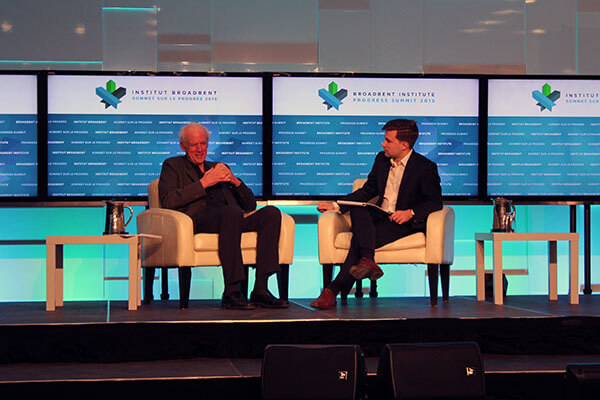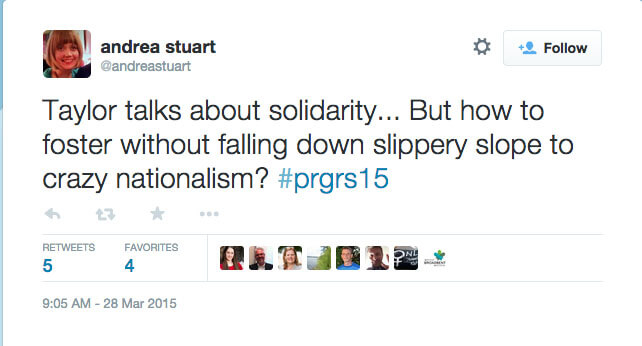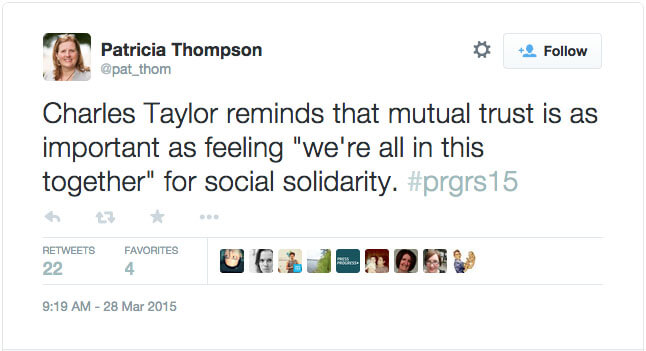An inclusive and equitable society can only be built through solidarity. This was the central message of Charles Taylor’s keynote at the Broadbent Institute’s 2015 Progress Summit in Ottawa this past weekend. The political philosopher spoke on Saturday about the danger of rising xenophobia and conservative sentiments, and gave thoughts on how to build a more inclusive Canada.
Taylor cited rising social and economic inequality as one of the central reasons for growing right-wing nationalist movements. Across the world, this trend affects ethnic and immigrant populations who face growing discrimination and alienation. This has also created divides within social movements, said Taylor, referring to political and labour groups whose aims have become more splintered over the last few generations.
Taylor criticized Prime Minister Stephen Harper’s anti-niqab comments as being part of dangerous and dividing rhetoric.
In Canada, these divides can be seen in the debates over the Quebec Charter of Values, in which political groups across the spectrum, as well as ethnic and religious groups, became part of the discourse. Taylor criticized Prime Minister Stephen Harper’s anti-niqab comments as being part of dangerous and dividing rhetoric.
Taylor also spoke about how the creation of identity can foster inclusion or exclusion. By continuing to redefine what it means to be Canadian, we can encourage greater acceptance and diversity, he says.
Using France as an example of how identity can change over time, Taylor talked about how attitudes to immigration and what makes one “French” have become more limited. Several generations ago, people from all over Europe could assimilate into French society. Now, the country is often alienating to immigrants, especially those in the religious minority.
 United Movements for Greater Good
United Movements for Greater Good
In a question and answer period with student activist and author Gabriel Nadeau-Dubois (pictured to the right), Charles speculated on key lessons and solutions that can be taken from past movements such as the Quebec protests. He stressed that solidarity between groups was essential, created through one on one interaction with a diversity of people.
He also advocated for different movements and political parties to work together and recognize their similarities. Developing central, less specific aims could help create greater understanding. Taylor spoke about how the splintering of political and labour movements over the past few decades only creates further divides and hinders the achievement of common goals.
[Gabriel]Nadeau-Dubois posed a final question to Taylor: Are you optimistic about the future? Ultimately yes, Taylor concluded, to standing applause from hopeful audience members.
Nadeau-Dubois and Taylor also discussed the value of encouraging young leadership. By supporting the participation of young people in the social and political sphere, we can build a more robust democracy, Taylor said.
Nadeau-Dubois posed a final question to Taylor: Are you optimistic about the future? Ultimately yes, Taylor concluded, to standing applause from hopeful audience members.

Putting the Vision into Action
Conference participants had differing reactions to Taylor’s speech. Post session discussions (which continued on Twitter as seen to the left) reflected on how Canada has changed since the Quebec protests and what work is still needed.
Kofi Hope, a conference participant who also spoke on the summit’s closing panel, thought that Taylor’s strategy of redefining identity is more difficult than it sounds due to existing stereotypes. “When people talk about fluid identity, no matter if you want to be fluid, you are already categorized by society because of how you look and how you dress.”
“It is a position of privilege to think of this place where you can define your identity.” – Kofi Hope
 Furthermore, Hope pointed out, diverse perspectives are needed when it comes to understanding identity. “It is a position of privilege to think of this place where you can define your identity,” he said, referring to how markers of skin tone, religious wear and many other things can force an identity upon someone.
Furthermore, Hope pointed out, diverse perspectives are needed when it comes to understanding identity. “It is a position of privilege to think of this place where you can define your identity,” he said, referring to how markers of skin tone, religious wear and many other things can force an identity upon someone.
Hope also thought Taylor’s point about creating solidarity between ethnic, religious and political groups was especially important. “There’s a difference between having empathy for a concept and having empathy for a person,” he said. “Because of how our brains are wired we need that interpersonal connection, to help us see people as human beings and see the texture and nuance of their lives.”
Ausma Malick, a Toronto activist who also spoke at the conference, thought that solidarity was especially important with respect to recent debates on religious and political freedom. “We also have to be very mindful of conservative fear-mongering forces that want to use these moments of complexity to drive us apart.”
She added that this is about much more than just knowing people. “Solidarity is about listening and learning and respecting, and being a good ally… But solidarity has to be an action and not just words.”



